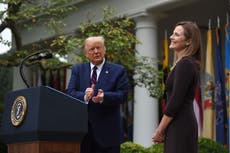Biden pleads with Republicans to wait until 2021 to confirm Supreme Court nominee
Democratic presidential nominee opposes Amy Coney Barrett’s nomination to replace Ruth Bader Ginsburg
Democratic presidential nominee Joe Biden has pleaded with his former Republican colleagues in the Senate to wait until the next president has been inaugurated to seat a replacement on the Supreme Court for the late Justice Ruth Bader Ginsburg, arguing that voting is already underway in several states.
“People are voting right now,” Mr Biden said during a brief appearance on Sunday to discuss Donald Trump’s selection of federal appeals court judge Amy Coney Barrett to fill Justice Ginsburg’s void.
Americans are voting early “because they know the very soul of this country is at stake, because they know that the decisions of the Supreme Court affect our everyday lives,” the former vice president said.
“Our voices may not matter to Donald Trump. They may not matter to [Senate Majority Leader] Mitch McConnell,” he said. But there are other Senate Republicans whom Mr Biden believes know better than to confirm a Supreme Court justice with a lifetime appointment when the early voting period has already begun in many corners of the country.
“I urge every senator to take a step back from the brink. Take off the blinders of politics for just one critical moment. Stand up for the constitution you swore to uphold,” Mr Biden said.
Mr McConnell has vowed to hold a confirmation vote once Ms Barrett’s nomination advances out of the Senate Judiciary Committee, although he has not said whether that will happen before or after the 2020 election.
Judiciary chairman Lindsay Graham has confirmed that his panel will vote to advance Ms Barrett’s nomination by 22 October, teeing up a potential confirmation vote on the floor of the Senate before the end of the month.
That vote could take place just days ahead of the 3 November elections.
Democrats on the Judiciary Committee have “no procedural silver bullet” to stop Ms Barrett’s nomination from proceeding to the Senate floor before election day, minority whip Richard Durbin has said.
The No 2 Senate Democrat, who also sits on the Judiciary panel, told ABC News’s George Stephanopoulos on Sunday that his party could "slow it down perhaps a matter of hours, maybe days at the most - but we can’t stop the outcome”.
Mr Biden on Sunday once again declined to answer a question from a reporter on whether he would “pack” the Supreme Court - that is, increase the number of justices on the bench to dilute the expected 6-3 conservative majority if Ms Barrett is confirmed.
Answering such a question would distract from the conversation at hand, he said, which is about stopping Republicans from confirming a justice in the middle of an ongoing election, even though they refused to hold hearings for 2016 Barack Obama nominee Merrick Garland more than seven months out from that year’s election.
“This is about your healthcare. This is about whether or not the [2010 Affordable Care Act] will exist. This is about whether or not, pre-existing conditions will be continued to be covered. This is about whether or not a woman can be charged more for the same procedure as a man,” Mr Biden said.
Democrats have railed against Mr McConnell, Mr Graham, and other Senate Republicans who blocked confirmation proceedings for Mr Garland.
At the time, Republicans said Mr Garland’s nomination had come too close to the election.Mr McConnell tried to explain last week that the political circumstances are different now: Mr Obama was asking an “unusual favour” of the Republican Senate majority to seat his nominee in an election year, Mr McConnell said, whereas now the White House and Senate are controlled by the same party.That statement, while factual, does fall in line with Mr McConnell’s reasoning for blocking Mr Garland’s nomination in 2016.“The American people should have a voice in the selection of their next Supreme Court justice. Therefore, this vacancy should not be filled until we have a new president,” the majority leader said at the time.


Join our commenting forum
Join thought-provoking conversations, follow other Independent readers and see their replies
Comments